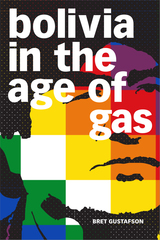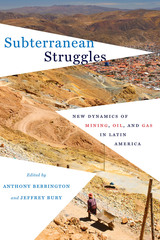2 books about Gas

Bolivia in the Age of Gas
Bret Gustafson
Duke University Press, 2020
Evo Morales, Bolivia's first Indigenous president, won reelection three times on a leftist platform championing Indigenous rights, anti-imperialism, and Bolivian control over the country's natural gas reserves. In Bolivia in the Age of Gas, Bret Gustafson explores how the struggle over natural gas has reshaped Bolivia, along with the rise, and ultimate fall, of the country's first Indigenous-led government. Rethinking current events against the backdrop of a longer history of oil and gas politics and military intervention, Gustafson shows how natural gas wealth brought a measure of economic independence and redistribution, yet also reproduced political and economic relationships that contradicted popular and Indigenous aspirations for radical change. Though grounded in the unique complexities of Bolivia, the volume argues that fossil-fuel political economies worldwide are central to the reproduction of militarism and racial capitalism and suggests that progressive change demands moving beyond fossil-fuel dependence and the social and ecological ills that come with it.
[more]

Subterranean Struggles
New Dynamics of Mining, Oil, and Gas in Latin America
Edited by Anthony Bebbington and Jeffrey Bury
University of Texas Press, 2013
Over the past two decades, the extraction of nonrenewable resources in Latin America has given rise to many forms of struggle, particularly among disadvantaged populations. The first analytical collection to combine geographical and political ecological approaches to the post-1990s changes in Latin America’s extractive economy, Subterranean Struggles closely examines the factors driving this expansion and the sociopolitical, environmental, and political economic consequences it has wrought. In this analysis, more than a dozen experts explore the many facets of struggles surrounding extraction, from protests in the vicinity of extractive operations to the everyday efforts of excluded residents who try to adapt their livelihoods while industries profoundly impact their lived spaces. The book explores the implications of extractive industry for ideas of nature, region, and nation; “resource nationalism” and environmental governance; conservation, territory, and indigenous livelihoods in the Amazon and Andes; everyday life and livelihood in areas affected by small- and large-scale mining alike; and overall patterns of social mobilization across the region. Arguing that such struggles are an integral part of the new extractive economy in Latin America, the authors document the increasingly conflictive character of these interactions, raising important challenges for theory, for policy, and for social research methodologies. Featuring works by social and natural science authors, this collection offers a broad synthesis of the dynamics of extractive industry whose relevance stretches to regions beyond Latin America.
[more]
READERS
Browse our collection.
PUBLISHERS
See BiblioVault's publisher services.
STUDENT SERVICES
Files for college accessibility offices.
UChicago Accessibility Resources
home | accessibility | search | about | contact us
BiblioVault ® 2001 - 2024
The University of Chicago Press









